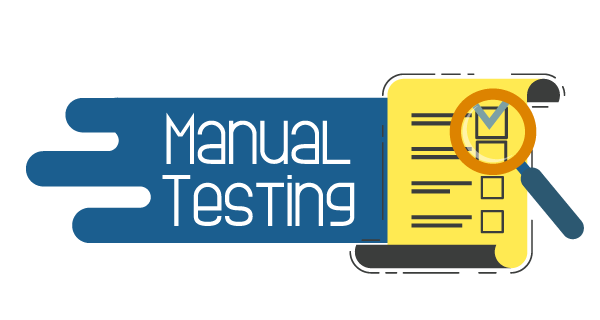WANT TO DEVELOP A FLAWLESS SOFTWARE APPLICATION? TRY OUR EXCEPTIONAL MANUAL TESTING SERVICES ON YOUR EXCITING MANUAL SOFTWARE TESTING PROJECT NOW!!
WHAT are MANUAL SOFTWARE TESTING SERVICEs?
When application testing takes place manually, it’s either manual testing or human testing. There are no automation tools used for testing an application in such services. Testers execute the test cases manually through their logical reasoning and inferences to seek out several bugs or issues that automation testing sometimes gets ignored. Detecting bugs in any application is possible through manual testing services. The world has become more advanced and automated; yet, manual testing has preserved an essential role in solving any software application issues effectively, even in this era of automation. Perfection is crucial for customer satisfaction through your application’s quality, and manual testing can make it possible to execute the testing process.
Here comes the role of Vihat Technologies. Through a unique and excellent blend of perfection in software testing services and testing processes, domain knowledge, technological expertise, and valuable tools, we aim to help businesses develop fault-free software applications. Vihat Technologies is a manual testing company in India with its foundation comprising excellent and matured test processes, experience, in-house accelerators, and industry-leading manual testing tools.
The proper planning of testing is also crucial, and we know it. Thus, businesses can rely on us for testing applications strategically – everything from optimization of test strategy to post-production support. Our manual testing company in Ahmedabad includes a user-centric approach which helps in the improvement of our engagements as a whole. We ensure full traceability of the business requirements to the test cases designed and executed for extensive test coverage. Our manual testing services are effective and reliable. Since we are an experienced and knowledgeable manual testing services company, our services will also include extensive reporting from time to time to keep you informed on the testing procedure and results.
BENEFITS OF MANUAL TESTING SERVICES:
Automation is helpful when it comes to software testing services in this era. It comes with efficient results, less time consumption, repeatability, reusability, precision, and effective results. However, there are some areas where manual software testing services become crucial, preferable, and unavoidable. Besides exceptional and robust testing processes and technology expertise, strong domain skills are essential for effective manual testing. Thus, both automation and manual testing are necessary on their own terms.
- In software testing, one can also notice some unusual and critical defects or flaws that are identifiable through manual testing.
- It has this precision, resulting from critical thinking, logical reasoning, and inferences of the individual manual tester.
- The testers can successfully point out the defects, which are sometimes impossible or omitted through automated testing.
- Through manual testing, the tester can explore software applications to identify bugs and failures.
- Manual testing is a cost-effective and flexible means of software testing method.
- It helps in lowering the software development expenses when involved in the initial stages of the software development and helps develop good quality software applications.
- The thing that makes manual testing highly beneficial is that it can help enhance and improve software application’s user experience and user-friendliness. This is because it takes place from the perspectives of the end-users of the application.

If not, by manual testing services, then how can you be sure of the performance, quality, security, and design of your developed software application?

OUR MANUAL SOFTWARE TESTING SERVICES:
Functional Testing
- Functionality Testing: Our manual testing company in India performs functionality testing. The correct and consistent functioning, integrating, and performance of a software application are identified as per the business specifications.
- Regression Testing: Regression testing is done to backup the previously working functionality to ensure no changes impact it.
- Smoke Testing: Smoke testing is a decision-making test, and it can also be called ‘Build Verification Testing.’ It helps decide whether or not there is stability for further testing of the build with critical functionalities.
- Pre-QA & Sanity Testing: Before carrying out any detailed tests, we perform some tests to identify whether bugs have been fixed or the functionalities are working.
- Confirmation Testing: When the defects are fixed, they need to be re-checked to ensure better results. That’s when the use of confirmation testing comes.
- Black Box Testing: With no adequate knowledge of how a software application gets structured within a box, black box testing, as a specification-based technique, supports only inputs and outputs.
- Exploratory Testing: Our manual testing company in Ahmedabad also incorporates exploratory testing. It’s an experience-based testing technique where test cases aren’t created beforehand, but the test engineers test the application on the fly and write down the ideas about what to check. It’s more useful when there aren’t any inadequate specifications and time is severely limited.
- Error-Guessing: In a software application, there are some problematic areas. Error guessing helps detect such problems with the help of an experienced test engineer’s experience and heuristics to guess the complex and risky areas of the application because it’s an experience-based testing technique to execute the testing process.
- Installation Testing: Installation testing is also a part of manual services, which helps in testing whether the software application has been installed efficiently and ensures whether the application functions adequately or not.
- Configuration Testing: Configuration testing is also a part of manual testing services. It helps find the best configuration for a software application by checking its performance against different software and hardware combinations. It ensures that the application has incredible functioning as per business requirements and can still be free of bugs or flaws.
- Risk-Based Testing: In such testing, a software application is tested for its functions and features based on importance, priority, and potential failures.
- Negative Testing: Negative testing is also a part of the services of our manual testing company in India. It tests whether the application has the plot based on the requirements of the business or not. Negative testing also ensures if the application is capable of handling unwanted inputs and user behaviors.
- Structural Database Testing: In structural database testing, testing elements within a database repository is tested. They are mainly used for data storage that can’t be manipulated directly or interact with actual users.
- A/B Testing: Different segments of website visitors at the same time will see two variants of the identical web page through the A/B testing services of our manual testing company in Ahmedabad.
Non-Functional Testing
- Usability Testing: Our manual software testing services also include the testing of software applications to check whether it has been developed as a user-friendly application or not.
- User Interface Testing: An application has a graphical user interface too. Our manual testing company in Ahmedabad also provides user interface testing services that ensure the proper functioning of the graphical user interface based on the specifications.
- Visual Testing: Any visual changes in UI are automatically detectable through visual testing services.
- Compatibility Testing: When an application is developed, it must also be identified to run on different databases, browsers, OS, hardware, mobile devices, and networks. For that purpose, compatibility testing comes to the rescue.
- Interoperability Testing: Interoperability testing comes to ensure whether an application can interact effortlessly with other systems or software components without going through any compatibility issues.
- Portability Testing: When one wants to transfer an application from one environment to a different one, portability testing is performed. For example, – moving an application from Windows 8 to Windows 10.
- Accessibility Testing: Such a testing service of our manual testing company in India helps in ensuring that a software application is accessible to people with disabilities.
- Recovery Testing: A software application may go through several issues such as an attack, crash, hardware issues, etc. Recovery testing ensures how quickly, accurately, and effortlessly it can recover from such a situation.
- Internationalization Testing: Internationalization testing ensures that an application works efficiently across multiple regions and cultures.
- Localization Testing: When an application gets localized for a specific target audience, its standard requires verification. Localization testing helps verify that the standard is adequate and only takes place on a localized software application version.
- Compliance Testing: In any application’s lifetime, there is a complaint state. Compliance testing tests and maintains this complaint state for the smooth running of the regulatory and compliance board.
- Maintainability Testing: Our manual testing company in Ahmedabad also tests whether the application would modify and update when required. It happens with the help of our maintainability testing.
- Efficiency Testing: Efficiency testing helps in verifying how many resources are required to perform a specific function so that the application can function smoothly.

Testing Levels
- Component Testing: Component testing verifies each component separately without integrating with other components.
- Integration Testing: Integration testing helps verify different software components’ interaction and detection of interface defects by checking the code units.
- Big Bang Integration: In such an integration testing technique, all the components are combined at once, resulting in a complete system. Once done, the entire system is tested as a whole.
- Top-Down Integration: When the top-level modules get ready, the integration strategy is top-down integration.
- Bottom-Up Integration: When the bottom-level modules get ready, the integration strategy that takes place is bottom-up integration.
- Sandwich Integration: When both the bottom-up and top-down integration approaches get mixed, the resulting integration strategy is the sandwich integration.
- Incremental Integration: When all the modules get integrated one by one, incremental integration gets performed after each step.
- Component Integration: When the integration strategy checks for the interactions among software components, component integration occurs after component testing.
- System Integration: When the integration strategy checks for the interactions among different systems, system integration occurs after system testing.
- System Testing: System testing is a testing level and also called end-to-end testing in which tests are performed to verify if a complete application aligns with its functional and non-functional requirements.
- Acceptance Testing: Our manual software testing services also provide acceptance testing that verifies whether a software application can handle the tasks based on real-life scenarios or not, following consistent specifications.
- User Acceptance Testing: We are a manual testing company in Ahmedabad that provides user acceptance testing as well. It is a testing methodology that helps users or customers involved in product testing validate their requirements.
- Operational Acceptance Testing: Before the production release of an application, whether an application is ready for operation or not is verified through operational acceptance testing of our manual testing services.
- Contract Acceptance Testing: Before the system acceptance, the contract acceptance testing gets tested against the acceptance criteria set or documented during a contract.
- Compliance Acceptance Testing: Compliance acceptance testing ensures to test a system against several regulations such as government, legal, or safety regulations before the system acceptance.
- Alpha Testing: Alpha testing occurs by internal testing teams at the developer’s site, which happens before deploying to the external clients.
- Beta Testing: Beta testing is a testing process that takes place at the end users’ site by the actual users for performing testing for the usability, functionality, reliability, and compatibility.
EXPECTATIONS FROM OUR MANUAL TESTING SERVICES:
Manual testing is not an easy task as it includes complexities and a challenging process. The human tester must have high analytical skills and exceptional attention to detail.
- We know the significance of getting the manual testing process to run smoothly.
- Our exceptional experts and professional testers can provide you with the best manual software testing services without having to worry about any complications.
- We are a leading manual testing company in India with the ambition of helping businesses in developing the best applications with the help of our manual testing services.
- We provide a mixture of different testing services that come with other techniques and tools.
- We offer quality help in terms of manual testing of an application that can detect problems of a software application without any hassle and assist businesses to attend to those issues.
- With all the tests, reports, and data documentation, we also help our clients stay up-to-date with the manual testing progress.

WHY CHOOSE US FOR MANUAL TESTING SERVICES?
- We provide incredible manual software testing services and have exceptional expertise when it comes to a wide array of software applications which includes but is not limited to mobile, web, IoT, desktop, wearable, database, cloud, and more.
- We support multiple development methodologies, including Waterfall, Agile, DevOps, and Hybrid models, with great collaborative work among the entire team related to a task.
- Expect a decrease in the cost of quality as we provide early involvement within the project lifecycle.
- We are a leading manual testing company in India with skilled testing professionals who help with manual testing processes. They have extensive experience and knowledge across multiple domains and technologies.
- We also provide test requirement techniques to ensure bi-directional traceability.
- To provide the best services to you, we use an organized approach to testing techniques and test cases to promote repeatability.
- We also have a risk-based testing methodology that will come in handy to address project, business, process, and technology risks.
- In our manual software testing services, we provide formalized defect documentation processes to ensure the reproducibility of defects.
- We live up to the expectations as we have expertise regarding all the well-known and valuable tools required for test management, lifecycle management, defect management, etc.
- We, as a leading manual testing company in Ahmedabad, know that information matters. Thus, we keep tabs on and prepare reports on the testing’s daily, weekly, and monthly status. We also provide details of the test execution status and details of application issues and bugs.
OUR MANUAL SOFTWARE TESTING PROCESS:
We provide manual software testing services to our clients through a collaborative testing process in an agile manner. The manual testing process we follow includes:
In this stage, we initiate the task by analyzing requirements regarding the software application. A software requirement specification document helps us in the analysis process as an initial part of our manual testing services.
In the planning stage, our manual testing company in India writes a precise, clear test strategy and test plan based on the initiation process regarding the analysis of requirement specifications. They serve as a guideline for all the testing processes, schedules, test coverage, etc. throughout the entire software development and testing life cycle.
In this stage, we start with the test design, which includes writing and reviewing repeatable test cases according to the requirements determined in the document. Where appropriate, we also focus on non-functional requirements, existing rules, or application logic while writing test cases.
In this stage, we execute the test cases and detect any bugs or flaws in the software application to identify if the requirements are as expected. Here, we also participate in a bug triage meeting to identify and prioritize the most critical defects, along with less critical bugs and gaps. We also get the agreed defects fixed and re-tested before the next testing cycle.
In this stage, we cluster the bugs based on the impact, priority, and severity and report the status of the bugs, test cases, and test cycles as part of our manual software testing services.
In this stage of our manual testing services, we analyze the testing reports and discuss with the team the root cause, improvement area, and action plan.
FREQUENTLY ASKED QUESTIONS:
Why are manual testing services essential in this technological era?
Manual testing services include logical reasoning, inferences, and instinct work of a human tester. It’s less costly, and you can gain quick feedback through it, which makes it essential even in today’s situation.
Why do businesses go for manual testing?
Manual testing helps businesses develop and enhance their software applications perfectly by testing the functionalities of an application and simulating an end-user perspective.
What advantage does manual testing have over automation testing?
In manual testing, the tester doesn’t need to know about automation testing, it’s less time-consuming, has cheaper initial investment, and the tester can also perform ad-hoc or risk-based testing through it. These are the advantages that manual testing services have over automation testing.
Is coding knowledge necessary for manual testing?
No, manual software testing services don’t require the knowledge of coding for testing the software applications.















